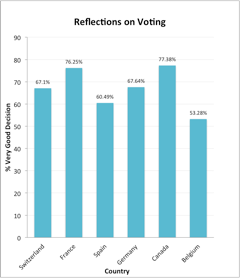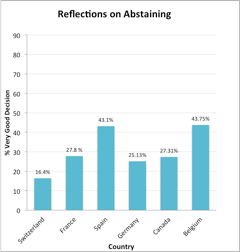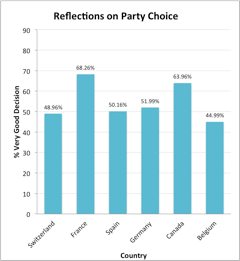By Anja Kilibarda and André Blais, University of Montreal.
What is the story?
The MEDW survey data is well suited to exploring citizens’ ex post facto judgments about their voting decisions. In this blog post, we report the cross-national differences in respondents’ reflections on their electoral choices and systematically compare voters to abstainers. We show that most voters believe that they made the right choice, while abstainers are not so sure.
Voters’ Reflections
In the post-election MEDW surveys, we asked respondents whether they considered that voting/not voting was a good or bad decision. Those who voted were also asked about whether they believed their decision to vote the way they did—for whichever party or candidate they did—was a good or bad decision. The Likert-type response options ranged from “a very bad decision” to “a very good decision.” In the figures below, regional and national elections within countries were collapsed since the results did not substantially vary, as were the regions surveyed within each election.
Figure 1 shows the percentage of voting citizens across the six countries covered by the MEDW survey that believe their decision to vote was a very good decision. Perhaps unsurprisingly, in nearly every case, a substantial majority of respondents feel they made a very good choice in turning out on Election Day. The proportion is highest in Canada and France where fully about 77% and 76% of respondents, respectively, believe voting in the particular election was a very good decision. The proportion is lowest in Belgium, where only a slight majority of the population believes they made a very good decision.
This result is interesting in light of the fact that Belgium represents the only country surveyed wherein voting is mandatory. It is possible that lacking the ability to choose whether to turn out or not decreases an individual propensity to judge voting as a good decision. Indeed, it could be argued that deciding to vote in Belgium is not a genuine decision at all. The three middling cases are Switzerland, Spain, and Germany, where the percentage of respondents very satisfied with voting is in the 60s.
Abstainers’ Reflections
Figure 2 reports the percentage of abstainers who believe their decision to not vote in the relevant election was a very good decision. Given the social norm to vote, the proportion of people judging their decision to abstain as very good is relatively low across the board. In Switzerland, only 16% of people believe their decision to vote was a very good one. In France, Germany, and Canada, these numbers hover around 26%.
Interestingly, the percentages are nearly double in Spain and Belgium. A relatively high proportion in Spain might be explained by higher levels of disillusionment with democratic processes in light of persisting corruption. Transparency International considers the Spanish government to be the most corrupt of the governments of our six countries. Moreover, Spanish citizens perceive more corruption in their national government than citizens of the six other countries (see this former MEDW blog post). Given that corruption has been found to discourage voter turnout (see for example Anderson and Tverdova, 2003), it is reasonable to suspect that it might also encourage abstaining individuals’ justification of their choice as a good one.
In Belgium, deciding not to vote entails taking a risk of having to pay a fine. As such, it seems to make sense that those who took that risk feel strongly they made a good decision. It is possible they spent more time deliberating and are thus more likely to have made a well thought out decision. Engaging in high-risk behaviour may also fortify a choice-supportive bias: because the emotional cost of abstaining is relatively high for the average person, the strength of the ex post facto justification of the cost needs to be correspondingly high. Overall, in each country, the proportion of abstainers who believe they made a very good choice is much lower than the proportion of voters who believe the same.
Voters’ Reflections About Party Choice
Finally, Figure 3 represents the distributions for the percentages of people who believe they made a very good choice in voting the way they did (that is to say, for the political party or candidate for whom they voted). The proportion very satisfied is highest in France, where slightly over 68% of respondents believe they made the right party choice. It is second highest in Canada, where approximately 64% of respondents in Ontario and Quebec, the provinces surveyed, believe they made a very good party choice. Belgium once again has the lowest proportion of very satisfied respondents with only 45% of the population believing their decision to vote for the party they did was a very good one.
This outcome is perhaps due to a high number of competing parties leading to a greater propensity for voters to make an error in their choice, perhaps because collecting sufficient campaign information to make a correct choice is more difficult (see for example Lau et al. 2014). Indeed, Belgium and Switzerland both had the greatest number of parties competing in their respective elections and both show the lowest proportions of citizens satisfied with their choice, between 44-49%. That said, Spain and Germany report only slightly more very satisfied respondents, at 50% and 52%, respectively, despite having about half the competing parties as Belgium and Switzerland.
Conclusion
Taken together, these results show that voters tend to believe they made a good choice in voting and abstainers tend to be regretful of not having voted. Belgium is something of an outlier in both cases, perhaps due to its mandatory voting regulation. And abstaining Spaniards tend to be particularly satisfied with their abstention. Yet in almost all cases, only about half of voters are happy with their party choice, a number that is surprising in light of people’s tendency for post hoc rationalization.
References
Anderson, C. J. and Tverdova, Y. V. 2003. “Corruption, Political Allegiances, and Attitudes Toward Government in Contemporary Democracies.” American Journal of Political Science 47(1):91–109
Richard R. Lau, Parina Patel, Dalia F. Fahmy and Robert R. Kaufman. 2014. “Correct Voting Across Thirty-Three Democracies: A Preliminary Analysis.” British Journal of Political Science 44: 239-259



